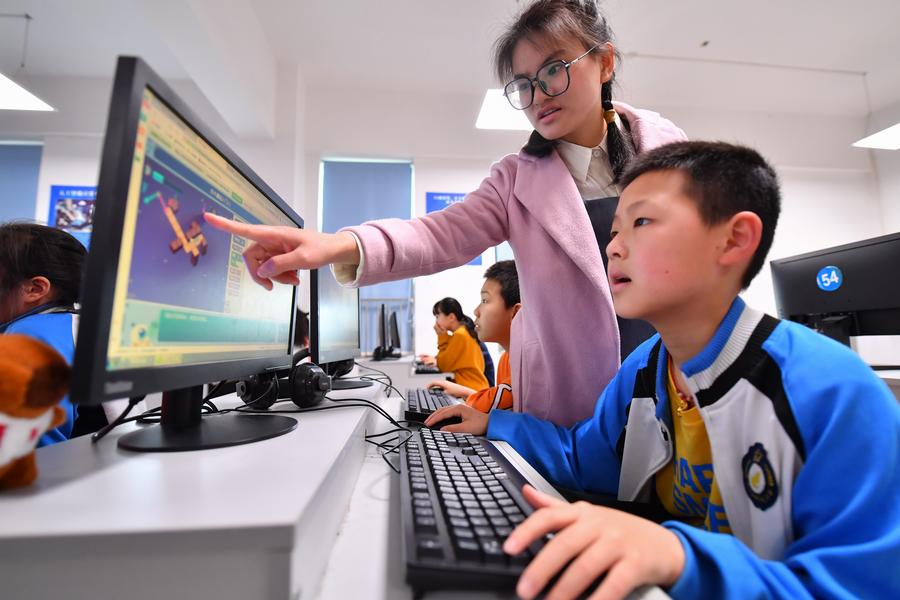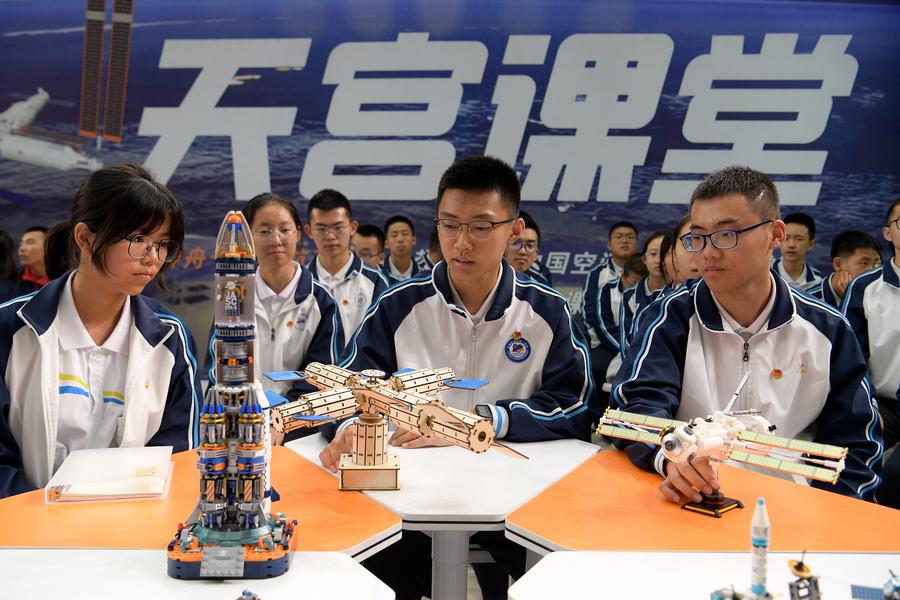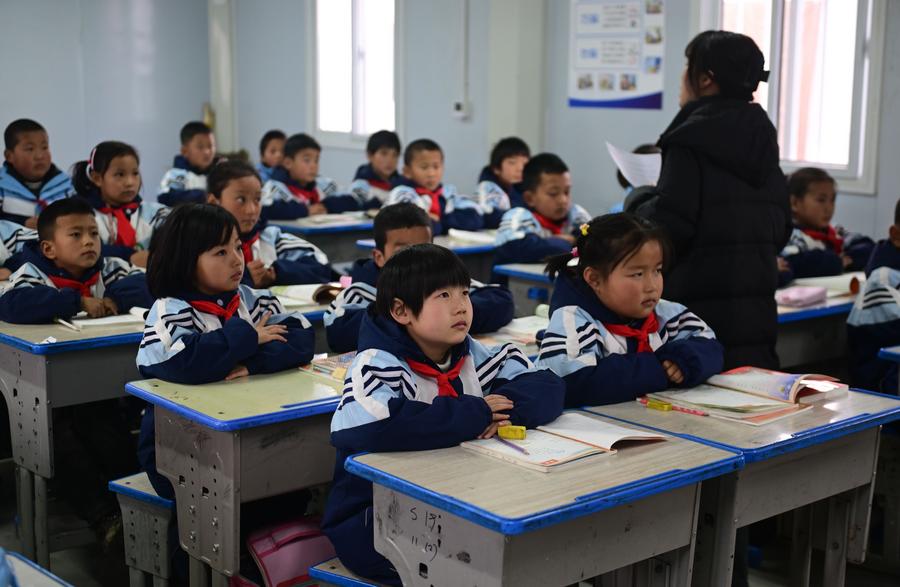


A teacher instructs as a student uses a computer in a programming class at a primary school in Yuhu District of Xiangtan City, central China's Hunan Province, April 11, 2024. (Xinhua/Chen Zeguo)
BEIJING, June 24 (Xinhua) -- Peking University life sciences professor Zhang Yan, who has been researching Alzheimer's disease for two decades, has taken on a new mission this semester: educating young teens.
Beyond lectures and experiments, Zhang is committed to giving her young students an authentic glimpse into the world of scientific research. She believes such hands-on learning should begin early in basic education, and as a scientist, she sees it as her responsibility to contribute.
Zhang is one of thousands of researchers to be appointed as a "vice principal of science" -- a position introduced by China's Ministry of Education two years ago, in an initiative aiming to ensure every primary and secondary school engages the services of at least one scientific researcher from a university, research institute or technology company to strengthen science education.
SCIENTIST-LED CLASSES
Dressed in a T-shirt and jeans, sipping milk tea and switching seamlessly between Chinese and English, Zhang teaches her middle school students much like she does her doctoral candidates in university labs.
This casual approach is the first message she hopes to convey: scientists are not always solemn, bookish or eccentric. During her first lecture at Beijing Guangqumen Middle School in late May, she said that in reality, many scientists have diverse interests, lead balanced lives and possess both intellectual and emotional intelligence.
Similarly, Zhang seeks to dispel another common misconception about careers in science: success comes solely from hard work, much like scoring high in college entrance exams.
"You may spend years with few breakthroughs, and that is the first challenge scientists must face -- learning to deal with frustration," she said in English during a recent class.
Her students listened carefully, not distracted by phones or computers. They are preparing to enter senior high school after their summer vacation, and in three years, they will choose a university and a major.
"The earlier they learn, the more they benefit," Zhang said, noting that understanding scientific careers as teens will help them make choices in the future.
Using examples ranging from the discovery of penicillin to the gene-editing of white mice in labs, Zhang also encouraged her young students to develop habits of critical thinking, questioning authority and pursuing lifelong learning.
Next month, she plans to take them to her university lab, where they will observe and conduct basic scientific experiments.
"They will experience real scientific work," she said.

Students learn about spacecraft models at the fourth live class of the "Tiangong Class" series in Yan'an Science and Technology Museum in Yan'an, northwest China's Shaanxi Province, Sept. 21, 2023. (Photo by Deng Zhihong/Xinhua)
NATIONAL PUSH
To make classes more engaging, researchers nationwide are adopting diverse approaches. Besides lab experiments, some organize field expeditions or showcase models of scientific facilities such as lunar probes, submarines and large telescopes.
The study of emerging technologies like AI and humanoid robots has also made its way into classrooms, becoming part of the content being taught by scientists.
Tasked with more than teaching, these vice principals of science also help schools with science curriculum planning, teacher training and bringing in scientific resources, forming part of the country's broader picture of science education.
Since 2023, under a national "double reduction" policy launched in 2021 to ease the burdens of excessive homework and off-campus tutoring that students face in their compulsory education years, greater emphasis has been placed on enhancing science education and nurturing young people with both the potential to become scientists and aspirations to dedicate themselves to scientific research.
According to a January report by the state broadcaster CCTV citing the latest data from the Ministry of Education, 45 percent of primary and secondary schools have appointed a vice principal specializing in science over the past two years.
Schools are also striving to nurture their own science teaching staff. Beijing Haidian Aerospace Tuqiang Primary School, for example, employs 15 full-time or part-time science teachers. The number of science teachers in the country's junior high schools has increased by more than 8,400 nationwide, and by over 28,000 in senior high schools.
And technology firms are also joining this national push for improved science education. Leading AI company iFlytek has launched study tour programs to showcase its voice-recognition tools and robots to students, and carmaker Geely has opened its workshops to students, allowing young people to learn about the manufacturing process of new energy vehicles.

Students have a class in a prefabricated classroom in Guanting Town, Minhe Hui and Tu Autonomous County, northwest China's Qinghai Province, March 1, 2024. (Xinhua/Zhang Long)
DUTY OF EDUCATORS
However, serving as a school educator does not offer extra pay or benefits for her research work, Zhang said. "It is purely driven by a sense of duty."
China has intensified efforts to encourage scientist participation in science education. A revised Science and Technology Popularization Law came into effect last year and introduced concrete measures, such as those on professional recognition and evaluation, to reward researchers for public engagement.
Zeng Fankui, a researcher at the Lanzhou Institute of Chemical Physics under the Chinese Academy of Sciences, is passionate about popularizing his potato studies and serves as vice principal of science at three local schools.
He applauds the progress the country has made in science education, but points to some problems: many rural schools lack proper science equipment and specialized teachers, and traditional mindsets that prioritize rote learning over scientific thinking remain.
Xiong Bingqi, dean of the 21st Century Education Research Institute, said that the goal of the vice principal of science role is to cultivate true scientific literacy.
"If science classes only assign mechanical exercises, AI could replace them," he warned, adding that science education should shift focus from knowledge delivery to the cultivation of self-directed learning and nurturing innovation.
Students crammed with scientific knowledge alone will find it difficult to adapt to the rapid changes of the future, Xiong said.
点击右上角![]() 微信好友
微信好友
 朋友圈
朋友圈

请使用浏览器分享功能进行分享
